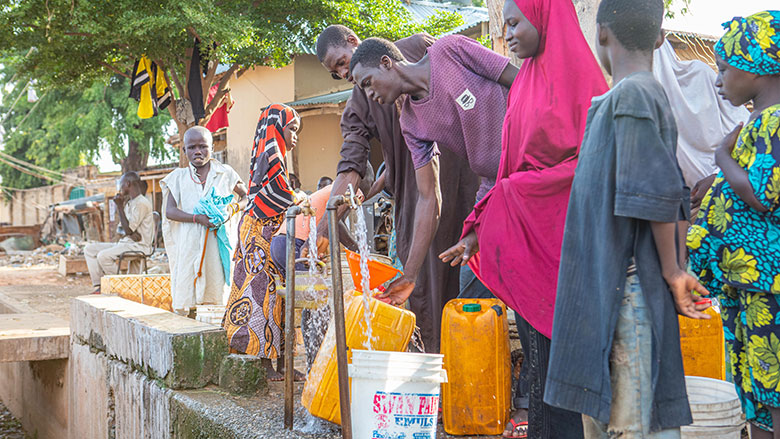Bukola Afeni
Water and sanitation are critical to achieving the Sustainable Development Goals (SDGs). Leaving no one behind’ is the central promise of the 2030 Agenda for Sustainable Development.
According to United Nations, a society can only achieve high rates of public health, gender equity, educational attainment, and economic productivity when all of its members enjoy their rights to water and sanitation.
Addressing the WASH challenges in Nigeria requires a multifaceted approach involving government, non-governmental organizations (NGOs), private sector entities, and communities.
The Executive Director of Inemo Foundation, Dr Opeyemi Adeosun implored the government to invest in prioritization of investments in water and sanitation for the attainment of goal 6 of the SDGs.
“We are pleading with the Government of Nigeria to look into the water and sanitation sector to ensure that Nigerians have access to safe drinking water. Most people in rural communities have the challenges of inadequate water supply”, he said.
Adeosun further charged experts in the WASH sector to engage in regular sensitization of citizens so they can practice constant hygiene and sanitation.
The Executive Director hinted that stakeholders in the WASH sector should constantly disseminate information regularly on propper hygiene.
“We do not have to wait till when there is an epidermic or emergencies before we begin to do the right thing or take the right decision. It is critical for stakeholders in the WASH sector to always sensitize the populace.
“COVID taught everyone the importance of handwashing and the role it plays in the prevention of epidemics and infections.
We do not have to relapse but rather spread our tentacles in creating more awareness about hygiene”, he said.
Adeosun further implored the Government
about ending emerging diseases in the health sector.
“It is high time the government start paying attention to issues of public health from the local government, state and the Federal Government. Government should create sustainable solutions to the issue of hygiene and sanitation”, he said.
He however insisted that more ground need to be covered in terms of behavioural change so as to make much progress.
“We are making small progress, until the behaviour of people change totally , the progress is not sustainable. Our population is skyrocketing on a daily basis and we need to improve in that regards.
” WASH stakeholders and government need to ensure that open defecation is reduced drastically. There should be penalties for individuals who urinate or defecate openly”, he said.
The Minister of Water Resources and Sanitation, Prof. Joseph Utsev, said collaboration with stakeholders in the WASH sector will aid in addressing hygiene challenges in the country.
He said there is a need to engage stakeholders at all levels, including development partners and private sectors to address the issue of hygiene in the country.
The Minister disclosed that the impact of climate change is numerous on the Water Sanitation and Hygiene(WASH) sector.
“There is an urgent need for collective action to ensure that Water Sanitation and Hygiene is made available and accessible to all residents in the country “, he said.
He disclosed that the Federal Government will not relent in ensuring that water is made available to all Nigerians in the country.
The Executive secretary of FCT Primary Healthcare Board, Dr Yakubu Muhammed disclosed that implementation of WASH facilities in Primary Health Care Centres will aid in improving the hygiene level in the country.
He hinted that organising behavioural programs for citizens will improve hygiene and sanitation in the country.
The Executive Secretary noted that it is critical at every level in the society to ensure that capacity building is carried out in terms of facility management.
“We all know that WASH has been focused on infrastructure Provision in times past, we also need to shift our attention to adequate facility management of our primary health care centres to improve hygiene and sanitation.
We will engage in capacity building programs for health workers and patient to change their health seeking behaviour”, he said.
This article was produced with the support of Speak Up Africa”s Media Fellowship Program

